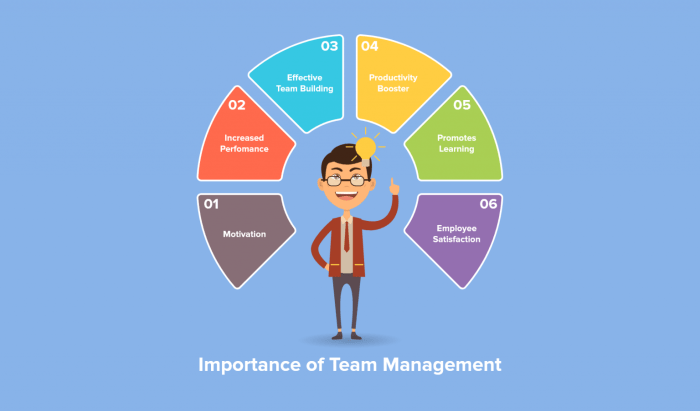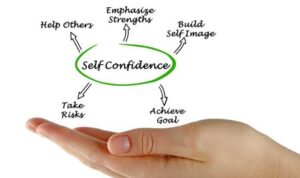Team Management Skills are essential in today’s professional landscape, ensuring teams operate cohesively and efficiently. From communication to conflict resolution, these skills play a vital role in maximizing productivity and fostering collaboration.
As we delve deeper into the key aspects of team management, we uncover the strategies and techniques that empower leaders to create a positive team culture and overcome common challenges in team dynamics.
Importance of Team Management Skills
Team management skills are crucial in a professional setting as they play a vital role in ensuring the success of a team. Effective team management skills can enhance productivity and collaboration among team members, leading to the achievement of goals and objectives in a timely manner.
Enhanced Productivity
- Proper delegation of tasks based on team members’ strengths and skills can lead to increased efficiency and output.
- Effective communication and clear goal setting can help in aligning team members towards a common objective, reducing misunderstandings and conflicts.
- Regular monitoring and feedback can ensure that the team stays on track and makes necessary adjustments to improve performance.
Improved Collaboration
- Encouraging teamwork and fostering a positive team culture can promote trust and respect among team members, leading to better collaboration.
- Creating an inclusive environment where everyone’s ideas are valued can result in innovative solutions and creative problem-solving.
- Resolving conflicts and addressing issues promptly can maintain harmony within the team and prevent disruptions to workflow.
Impact of Poor Team Management Skills
- Unclear expectations and lack of direction can lead to confusion and demotivation among team members, resulting in decreased productivity.
- Poor communication and inadequate feedback can hinder collaboration and cause misunderstandings, leading to conflicts and tension within the team.
- Ineffective conflict resolution and failure to address issues can create a toxic work environment, affecting team morale and overall performance negatively.
Key Team Management Skills
Effective team management requires a combination of essential skills that help leaders navigate challenges, foster collaboration, and drive success within their teams. Let’s explore some key team management skills and how they contribute to effective leadership.
Communication
Effective communication is crucial for team management as it ensures that team members understand goals, tasks, and expectations clearly. Leaders who communicate openly and actively listen to their team members can build trust, resolve conflicts, and foster a positive team environment. Strategies for improving communication skills include active listening, providing feedback, and promoting open dialogue within the team.
Delegation
Delegation involves assigning tasks and responsibilities to team members based on their strengths and skills. Delegating effectively empowers team members, promotes accountability, and allows leaders to focus on high-priority tasks. Leaders can develop their delegation skills by assessing team members’ capabilities, setting clear expectations, and providing necessary support and resources.
Conflict Resolution
Conflict is inevitable within any team, but effective leaders can manage conflicts constructively to maintain team cohesion and productivity. Conflict resolution skills involve identifying underlying issues, fostering open communication, and finding mutually beneficial solutions. Leaders can enhance their conflict resolution skills by practicing active listening, remaining neutral, and promoting a collaborative approach to problem-solving.
Decision-Making, Team Management Skills
Strong decision-making skills are essential for effective team management, as leaders often need to make timely and well-informed decisions that impact the team’s progress. Decision-making skills involve gathering relevant information, considering different perspectives, and evaluating potential outcomes. Leaders can improve their decision-making skills by seeking input from team members, weighing pros and cons, and reflecting on past decisions to learn and grow.
Strategies for Building a Strong Team: Team Management Skills

Building a strong team dynamic is essential for the success of any group project or organization. By implementing effective team management strategies, leaders can create a cohesive and productive team that works well together towards a common goal.
Team-building Activities
Team-building activities are a great way to foster collaboration and trust among team members. Examples of such activities include:
- Icebreaker games to help team members get to know each other
- Outdoor team challenges to build problem-solving skills and teamwork
- Volunteering together to create a sense of purpose and unity
- Team retreats or off-site meetings to strengthen relationships and communication
Role of a Leader
A leader plays a crucial role in creating a positive team culture. They are responsible for:
- Setting clear goals and expectations for the team
- Providing support and guidance to team members
- Encouraging open communication and feedback
- Recognizing and celebrating team achievements
Challenges in Team Management

Managing a team comes with its own set of challenges that can impact team communication, motivation, and performance. It’s crucial for managers to be aware of these challenges and have strategies in place to overcome them effectively.
Communication Challenges
Effective communication is key to a successful team, but it can be challenging when team members have different communication styles or when there are language barriers. To overcome communication challenges, managers should encourage open communication, provide clear and concise instructions, and use various communication tools to ensure everyone is on the same page.
Motivation Challenges
Keeping team members motivated and engaged can be a constant challenge for managers. It’s important to recognize and reward team members for their hard work, set clear goals and expectations, and provide opportunities for growth and development. By understanding what motivates each team member individually, managers can tailor their approach to boost morale and productivity.
Performance Challenges
Ensuring consistent performance from all team members can be a challenge, especially when dealing with different skill levels and work styles. Managers can overcome performance challenges by setting realistic performance goals, providing regular feedback and coaching, and implementing performance improvement plans when necessary. It’s important to address performance issues proactively to maintain team productivity and cohesion.
Conflict Resolution Challenges
Conflicts are bound to arise within a team, but how they are handled can make or break team dynamics. Managers should promote a culture of open communication, encourage team members to address conflicts directly and respectfully, and mediate when necessary. By addressing conflicts early and effectively, managers can prevent them from escalating and maintain team cohesion.






